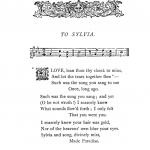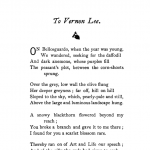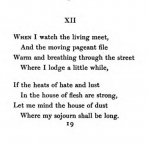"O LOVE, lean thou thy cheek to mine,
And let the tears together flow"—
Such was the song you sang to me
Once, long ago.
Such was the song you sang ; and yet
All items
Text:
ON Bellosguardo, when the year was young,
We wandered, seeking for the daffodil
And dark anemone, whose purples fill
The peasant's plot, between the corn-shoots sprung.
Over the grey, low wall the olive flung
Text:
I dreamed I stood upon a little hill,
And at my feet there lay a ground, that seemed
Like a waste garden, flowering at its will
With buds and blossoms. There were pools that dreamed
Text:
"The love that breeds
In my heart for thee!
As the iris is full, brimful of seeds,
And all that it flowered for among the reeds
Description:
The author describes a strange woman, named Vespertilia, and the beach where they met. She professes her love for the author, but is denied because the author's true love has died. Vespertilia then disappears, and the author is left remembering her better than their true-love.
Text:
In the late autumn's dusky-golden prime,
When sickles gleam, and rusts the idle plough,
The time of apples dropping from the bough,
And yellow leaves on sycamore and lime.
O'er grassy uplands far above the sea
Text:
In this poem, John Addington Symonds describes the painful feeling of unrequited and unaccepted love.
Text:
WHEN I watch the living meet,
And the moving pageant file
Warm and breathing through the street
Where I lodge a little while,
If the heats of hate and lust
Text:
Where art thou friend, whom I shall never see,
Conceiving whom I must conceive amiss?
Or sunder'd from my sight in the age that is
Or far-off promise of a time to be;
Text:
With whom, then, should I sleep? perhaps with thee,
And gaze into those eyes, those deep sad eyes,
Feeling the drowsy touch of thy vast wings.
Description:
John Gambril Nicholson published this poem in his collection, Love in Earnest: Sonnets, Ballades, and Lyrics. He wrote it to describe and admire all of the different types of boys that he encounters when walking through London.
White, Chris. Nineteenth-Century Writings on Homosexuality: A Sourcebook. Routledge, 2012.
Google Books, https://books.google.com/books?id=RQmoCHR0BZ0C&printsec=frontcover#v=onepage&q&f=false
Text:
As I go down the street
A hundred boys a day I meet,
And gazing from my window high
I like to watch them passing by.
I like the boy that earns his bread;
The boy that holds my horse’s head,
Text:
"Sweet, I blame you not, for mine the fault was, had I not been made of common clayI had climbed the higher heights unclimbed yet, seen the fuller air, the larger day.




